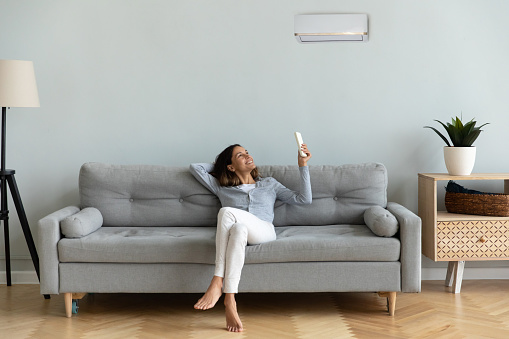
We all love the extra daylight and sunshine that springtime brings. But is your heating and cooling system prepared to go from one extreme to the other this year? We don’t expect your HVAC to always be top of mind from season to season. But for us, it is. So we’ve compiled all the most common questions you’ll want answered about your cooling system before temperatures really start rising.
- How often do air filters need to be changed?
This is one of those “it depends” There are two main types of filters, both of which are disposable. If you have a cheaper, fiberglass air filter, we’d recommend every 30 days. If you have pleated filters, which are typically more expensive, you should be good with every 90 days. Media or CleanEffects filters can last a little longer, only needing to be replaced about once a year. It will also depend on your usage — the more often you use your system, the less you should put off swapping your filters out. - What are the advantages of high-efficiency air filters?
While not 100% necessary, high-efficiency filters can do wonders for those with allergies or respiratory issues. Proper air filtration is crucial to the health of your family — and your unit too. By preventing dust and dirt from building up in your system, air filters help keep your air clean and your system running efficiently.High-efficiency air filters only improve that process with the ability to trap nearly 100 percent of particles as small as 0.3 microns (aka very, very small). Regardless of what you choose, changing them regularly is still a must.
- How long does HVAC equipment last?
The average HVAC system lasts 10-15 years. But the more time that passes, the less efficient your unit will become. In fact, the minimum SEER for any ACs manufactured now is 13, despite many systems exceeding that. Err on the side of caution and start looking at new options around the 10-year mark. Even if there are no major issues or red flags at the time, a more modern system will help you save on your energy bills. They also typically come with a 10-year warranty, which means you’ll be set for a while. - How do I know when it’s time for an AC replacement?
Speaking of replacement, there are some signs that will tell you when it’s definitely time to say goodbye — like if the temperature of the air coming from your vents isn’t strong enough, or it’s not the right temperature. Also, if you hear weird sounds like rattling, scraping, or screeching, or you notice excess moisture or leaking from your unit. If your bills have significantly increased but your usage hasn’t, that’s another good indication that it’s time for a new unit. - How often should I have my air conditioning unit serviced?
As a general rule of thumb, make it an annual thing. The longer you put it off, the less effectively your unit will run. And that will only speed up its deterioration and shorten its overall lifespan. By scheduling that routine maintenance each year, you’ll not only save on energy bills, but also any major repairs that tend to result from negligence. - What are the benefits of a programmable thermostat?
A programmable thermostat isn’t just another modern tech gimmick; it can save you a lot on your energy bills by allowing you to better control your heating and cooling use from anywhere. Instead of having the cold air pumping all day when no one’s home, you can set a timer to raise the temperature when you’re gone and lower it prior to your arrival. A smart thermostat will make sure you’re saving energy, even if you forget. - Why are heat pumps more efficient?
The reason heat pumps are one of the most energy efficient HVAC systems out there is because they don’t burn fuel to provide heat. Instead, they transfer heat energy from one source to another. This is why they function as both a heating and cooling system — making it as simple as the flip of a switch to go from winter to summer mode. As a result, you can minimize the amount of systems in your home that need repairs, maintenance, and replacements too. - How can I improve the air quality in my home?
The best way to improve air quality is to eliminate unwanted air from coming in. And the best way to do that is to seal your duct system. After that, you can either clean your existing filtration system or look into installing a new, more efficient one. - What should I set my thermostat to in the spring and summer?
When temperatures rise outside, it’s tempting to blast the cold inside, but finding the right balance between comfort and self-control will pay off big time. We recommend setting your thermostat to 75 degrees, or 72 at the lowest, with your fan set to AUTO, instead of ON. Each degree below 75 will cause your energy bill to go up 3-5%! - What are some ways I could keep my home cool more efficiently/lower energy costs?
You have a lot of options! For one, you can swap your current AC unit for a newer, more efficient one. While it may be a larger initial investment, it will have a big impact on energy bills and comfort in the long run. If you’re not quite there yet, you can set your thermostat to the predetermined temperatures listed above.Another helpful hack is to make sure your vents aren’t blocked by furniture or curtains. This will help air flow more evenly throughout your home. And if it’s a room you rarely use, shut the vents so you can direct the air to cool the areas of your home you spent more time in.
Ceiling fans are another great way to cool down a room without using a lot of energy. If you don’t have them, consider installing them in bedrooms and living areas. If you do have them, use them. The U.S. The Department of Energy reports that just one ceiling fan will allow you to turn up the thermostat as much as four degrees without sacrificing comfort.
And as always, remember to schedule regular maintenance from a professional to keep all units running their best.
- What can I do if my system doesn’t work well in certain rooms?
Variation from room to room is fairly normal, but significant differences in distribution can be a sign of air filtration issues or improperly designed ducts. If you’re having issues, contact our professionals to come take a look.
As you prepare for the warmer weather this spring, don’t forget about your cooling system! Contact our experts at Madsen with any questions you may have to help keep your home comfortable all season long.


